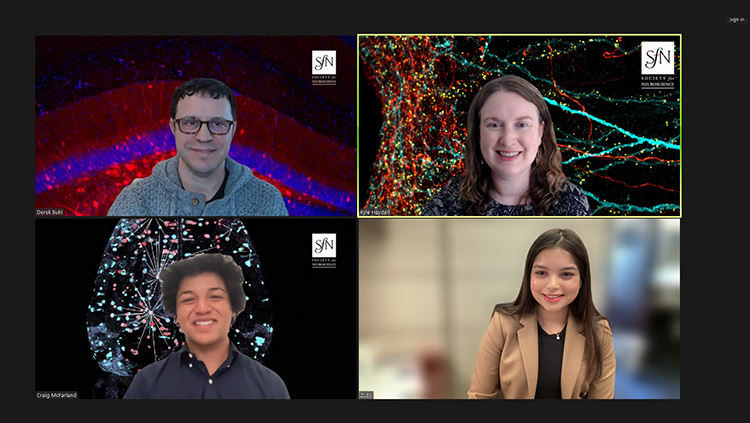Q&A: Founding eNeuro Editor-in-Chief Christophe Bernard

Christophe Bernard
Christophe Bernard is Director of Research at Inserm in Marseilles, France, and the founding editor-in-chief of eNeuro. Christophe served JNeurosci as reviewing editor from 2009–2014, and reviewing editor for Science (2012–2014). His work is focused on the principles governing brain dynamics in health and epilepsy, using ex vivo and in vivo electrophysiology, whole brain modeling, and the development of new technologies. His work has been recognized with several awards including the Michael Prize (for epilepsy) and the Felix Prize on Innovation. Christophe is an advocate for open science and science reproducibility, in particular via educational actions regarding the proper use of statistics, experimental bias, and fallacies in neuroscience.
Neuroscience Quarterly (NQ): Why was it important for SfN to create and support an open-access journal like eNeuro 10 years ago?
Christophe Bernard (CB): SfN's decision to support eNeuro, an open-access journal, was forward-looking, reflecting the novel trends in scientific publishing at the time. As an organization, SfN's mission is to serve the neuroscience community. By 2010, some members of SfN were already advocating for a shift towards an open-access format. This led to the creation of eNeuro, marking a significant step forward. The journal responded to the community's needs for greater accessibility to scientific research, fostering accelerated research and collaboration, promoting transparency and reproducibility, welcoming the publication of negative results, and enhancing education for both scientists and the public.
NQ: You served as the founding Editor-in-Chief (EiC) when eNeuro launched in 2014. What were some of the significant challenges you faced in building the journal?
CB: As the founding EiC of eNeuro in 2014, one of the most significant challenges we faced was positioning the journal as a leading platform for publishing neuroscience research. In an academic landscape heavily focused on the impact factor as a key metric of success, launching a new journal comes with the inherent challenge of not having an impact factor for several years. This raised a critical question: How can you persuade scientists to submit their work to a journal without this established metric?
SfN members were already familiar with the society's reputation, which lent credibility to eNeuro from the outset.
Being a society journal provided a unique advantage. This meant that SfN members were already familiar with the society's reputation, which lent credibility to eNeuro from the outset. We were transparent about our goals, positioning ourselves as a complement to JNeurosci. We also adopted innovative approaches that were seen as challenges initially but later emerged as defining strengths of the journal. Publishing negative results, addressing a critical gap in scientific publishing by recognizing the importance of all research outcomes, not just positive findings, was a major risk for the journal. Papers reporting negative results are far less cited (if at all), thus naturally decreasing the impact factor. We accepted the challenge, and eNeuro is often cited as an example to follow.
NQ: As you reflect on your 10 years as EiC, what are some of the accomplishments you are most proud of?
CB: Reflecting on my decade as EiC, I am most proud of accomplishments that, truthfully, belong to SfN as a whole rather than to me personally. The journal's success can be largely attributed to the dedicated and efficient staff who operated behind the scenes. This kind of commitment and efficiency is exceptionally rare, especially when contrasted with typical universities and other large bureaucracies. The seamless operation and growth of the journal would have been unimaginable without their tireless work.
The second most important accomplishment also involves the human element, i.e. our ability to engage hundreds of scientific leaders to serve as reviewing editors. This was no small feat. These individuals have been instrumental in shaping the journal's reputation over the years, supported by the great scientists who have joined our Advisory Board. Their contributions have been invaluable, and together, they have forged the journal's standing in the scientific community.
The third most important is enabling a positive experience for authors, reviewers, and reviewing editors alike. The double-blind system and the synthesis (one factual message is conveyed to authors) have been very effective. The metric of success is the very small number of appeals I am receiving per year (<5).
Lastly, I take pride in the initiatives we took in publishing confirmation studies, negative results, registered reports, and educational commentaries that alert/educate the community on issues like statistics and experimental bias.
One particularly promising avenue is the exploration of post-publication peer review.
NQ: What opportunities do you see over the horizon for eNeuro in its next phase?
CB: Looking ahead to eNeuro's next phase, I see significant opportunities for innovation and growth. One particularly promising avenue is the exploration of post-publication peer review. Introducing this as an experimental approach could revolutionize how research is validated and discussed within the scientific community.
Further expanding the series on education is also very important. After all, we are here to serve the community and not to make money (SfN is non-profit). Enhancing our educational offerings can empower researchers at all stages of their careers, from students just beginning their journey in neuroscience to seasoned scientists looking to update their skills or expand their knowledge base.
In summary, eNeuro stands close to a transformative phase, as it will evolve with the needs of the neuroscientific community.
NQ: The first scientific journals were established by the Royal Society in the U.K. and the French Academy of Sciences in the 17th Century. Why do you think that society-published peer-reviewed scientific journals are still important for scientific progress in the modern scientific world?
CB: The persistence and relevance of society-published, peer-reviewed scientific journals in the modern era — a question that has preoccupied my thoughts for over a decade — mirror a more general question on the mechanisms of progress and validation in science. Winston Churchill said: “Democracy is the worst form of government — except for all the others that have been tried.” This cynical comment encapsulates my view on the role of peer-reviewed journals in scientific progress.
I think there continues to be a role for journals edited by scientists for scientists, and I have been proud to play a role for eNeuro over the past decade.























